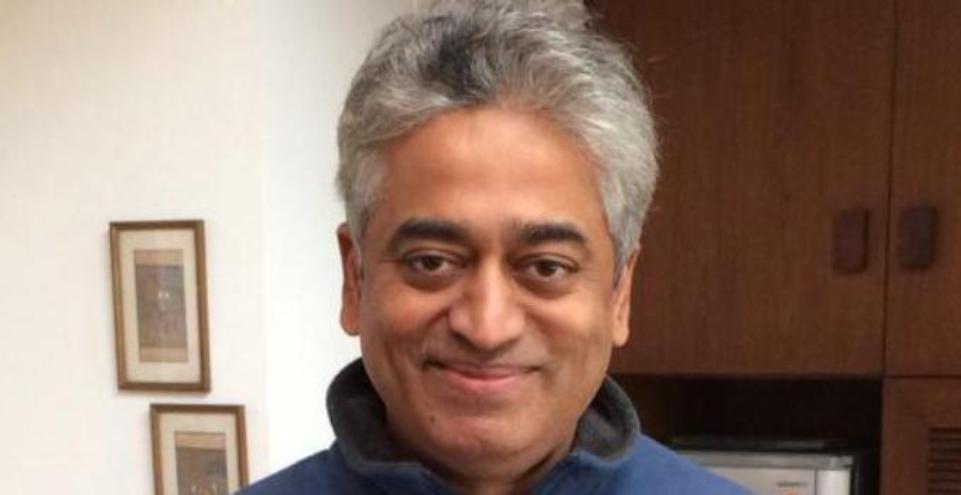
The Rajdeep Sardesai interview: 'Today, you are expected to be a bhakt or a permanent critic'
By Akash Banerjee for Scroll.in
In his most in-depth interview to date, well-known TV journalist and anchor Rajdeep Sardesai spoke about his complicated relationship with Prime Minister Narendra Modi, the crisis of credibility in the media, being the favourite target of online trolls, how it has been tough getting over the break-up with CNN-IBN and why it is factually incorrect to label him a ‘Congressi’.
Your chat with Lalit Modi was perhaps one of the most talked about news interviews of the year. After talking to you, he was forced to shun all TV interviews. Do you think the interview damaged his prospects?
I don’t think it damaged his prospects, but it surely showed up Lalit Modi and the Indian establishment for what they are. Here’s a person who’s "most wanted" on Indian shores and ministers are being asked to resign on his account. All this while he’s sitting in the luxury of the Aman Hotel by the Adriatic Sea!
To my mind the contrast was striking and ironical; it was almost a parody on Indian politics. Someone is living a life of luxury in a foreign country, while back home he’s being called a fugitive – while possibly nothing’s been done to bring him back all these years. The interview exposed this aspect for sure. Did it incriminate him? That only time will tell. However, Lalit Modi is a man who’s made it clear that if he goes down he will take others with him.
There is a perception that the media backed off after t Modi named names.
That’s rubbish, I don’t think the media has backed off; every story has a shelf life. A story sustains itself based on the credibility of the people at the heart of the story. If Lalit Modi is able to back all he says with hard evidence, then the story will stay relevant. If Modi tweets and scoots and then expects the media will stay on the story, it’s not going to happen. He will have to back all his claims with hard facts that incriminate people, or face the heat himself as the ED goes deeper into his dealings.
Finally, there’s no resignation forthcoming, so did the opposition fail in building pressure on the BJP over LalitGate?
I think LalitGate was used by the opposition to build a perception against the government. A government whose prime minister had said, “Na khaoonga na khaane doonga” (I won’t take bribes and won’t allow others to), was for the first time, finding itself on the back foot over the issue of propriety. So the opposition got a handle to beat the government with, especially before the monsoon session of parliament.
In terms of perception, the opposition has achieved what it wanted. Interestingly, I think Lalit Modi, too, achieved what he wanted: that he can’t be singled out for his acts, that many in the BCCI and the opposition were also in on it. Meanwhile, the BJP, too, by its strategic silence and unyielding stance also has sent out a clear message: that the media will not dictate the agenda of this government. The PM has made it clear that he’s not Manmohan Singh and will not sack ministers depending on what the media is broadcasting. Will this rigid position harm the long-term perception of the party? That remains to be seen.
Recently Akshay Singh from the India Today Group died under mysterious circumstances while covering the Vyapam scam. Two journalists were also set on fire because they dared to take on politicians and the mining mafia. Has the media lost its ability to work together to generate pressure on the system?
I don’t think so. Look at the Lalit Modi and Vyapam cases. There is a lot of concerted media noise. Of course, you will have the occasional one-upmanship; it’s unfortunate, but it happens. My bigger problem is: Does it take the death of a journalist for us to realise the scope of the Vyapam scam?
The acronym Vyapam stands for ‘Vyavsayik Pareeksha Mandal’ but perhaps it’s not seen as good TRP material! Then there is what I call the tyranny of distance; something that happens so far away from Delhi rarely excites the media.
So we in the media have to ask ourselves: did it have to take the death of a journalist for Vyapam to become 9 pm news? Similarly the death of Gajendra Singh at Jantar Mantar made farmer suicides prime-time news. While such deaths happen daily and are rarely covered, we in the media also have to ask ourselves the tough questions. What does it take for us to realise the importance of a story?
Are journalists under a lot more threat today?
Journalists have always been under attack. We register something when it happens closer to Delhi. But take a look at far-flung areas of India and you will see regular attacks happening. Today, journalists are not only under threat from the gun, but also from a section of people who want to take down the media. On our part, we have to ask ourselves why we have allowed ourselves to face this deeper credibility crisis that makes us soft targets today. Do we stand up united when the profession is under attack? I remember when the Shiv Sena had attacked the IBN office five years ago, many channels didn’t run the story, because the ‘competition channel’ was under fire.
STORY BY

Press Club
Content Team
Article posted on 13/07/2015
- Share This Story On:



